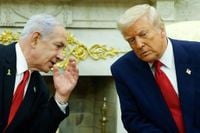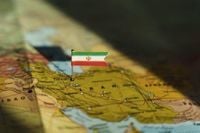As diplomatic tensions rise, Israel is reportedly preparing for potential military action against Iran's nuclear facilities, despite a lack of support from the United States. According to sources cited by Reuters, Israeli officials are considering a range of options, including airstrikes and special operations, aimed at curtailing Iran's nuclear ambitions.
In recent negotiations, Iran expressed a willingness to accept some restrictions on uranium enrichment. However, a high-ranking Iranian official indicated that Tehran would never agree to dismantle its centrifuges for uranium enrichment. "We will never agree to dismantle our centrifuges for uranium enrichment," the official stated, speaking on condition of anonymity.
These discussions come as Iran and the United States engage in a second round of talks in Rome, following a first meeting in Oman which both sides described as positive. However, significant differences remain, particularly regarding Iran's so-called red lines, which prevent any compromise on its nuclear program.
U.S. President Donald Trump has consistently declared that he will not allow Iran to obtain nuclear weapons. In a recent statement, he emphasized, "Iran cannot have nuclear weapons. If they do, everyone will be very unhappy. Your lives will be in great danger." Trump's administration previously withdrew from the Joint Comprehensive Plan of Action (JCPOA) in May 2018, a move that has since led Iran to significantly increase its uranium enrichment efforts.
Currently, Iran possesses approximately 275 kilograms of uranium enriched to 60%, a level that places it just steps away from weapons-grade uranium, which requires an enrichment level of over 90%. The International Atomic Energy Agency (IAEA) Director General Rafael Grossi acknowledged the urgency of the situation during his recent visit to Tehran, stating, "We are at a very important stage of negotiations and we know that we have little time."
Despite ongoing diplomatic efforts, the U.S. has struggled to satisfy Iran's demands for guarantees that no future administration will abandon the nuclear deal. Iranian officials have made it clear that they will not dismantle their nuclear infrastructure or halt enrichment activities as part of any new agreement.
In light of these developments, Israel is reportedly contemplating a limited military strike on Iran's nuclear facilities, which would require less support from the U.S. than previous plans that involved more extensive military operations. This shift comes after Trump expressed his preference for diplomatic negotiations over military action during discussions with Israeli Prime Minister Benjamin Netanyahu.
Israeli officials have proposed various attack scenarios to the Trump administration, ranging from airstrikes to special operations. However, these plans have faced pushback from the U.S., which has prioritized diplomatic channels. The New York Times reported that Trump effectively blocked Netanyahu's military plans in May, indicating that Washington was not prepared to support such actions.
As the situation evolves, Israel remains vigilant, monitoring the dynamics of U.S.-Iran negotiations closely. Reports indicate that Israel does not rule out military action in the coming months, with some officials suggesting that a limited strike could still be on the table.
On the Iranian side, officials have expressed readiness to cooperate with the IAEA to ensure that their nuclear program remains peaceful. Iranian Foreign Minister Abbas Araghchi stated during recent talks that Tehran is open to collaboration with the IAEA, provided that the U.S. lifts sanctions imposed on its oil and financial sectors.
As the second round of negotiations unfolds in Rome, both Iran and the U.S. appear committed to finding a mutually acceptable solution, albeit with significant obstacles remaining. The stakes are high, with the potential for military conflict looming if diplomatic efforts fail.
In the backdrop of these negotiations, Israel's military readiness continues to be a point of contention. While some Israeli officials advocate for a more assertive stance against Iran, others caution against actions that could further strain relations with the U.S. and jeopardize broader support for Israel.
Military experts suggest that any Israeli attack on Iran's nuclear facilities would carry considerable risks, potentially only delaying Iran's nuclear ambitions rather than eliminating them entirely. A senior Israeli official acknowledged the urgency of acting before Iran strengthens its air defenses, although no specific timeline for military action has been disclosed.
As the international community watches closely, the next steps taken by both Israel and Iran will be crucial in determining the future of nuclear negotiations and regional stability. The delicate balance between diplomacy and military action remains a critical factor in the evolving landscape of U.S.-Iran relations.







